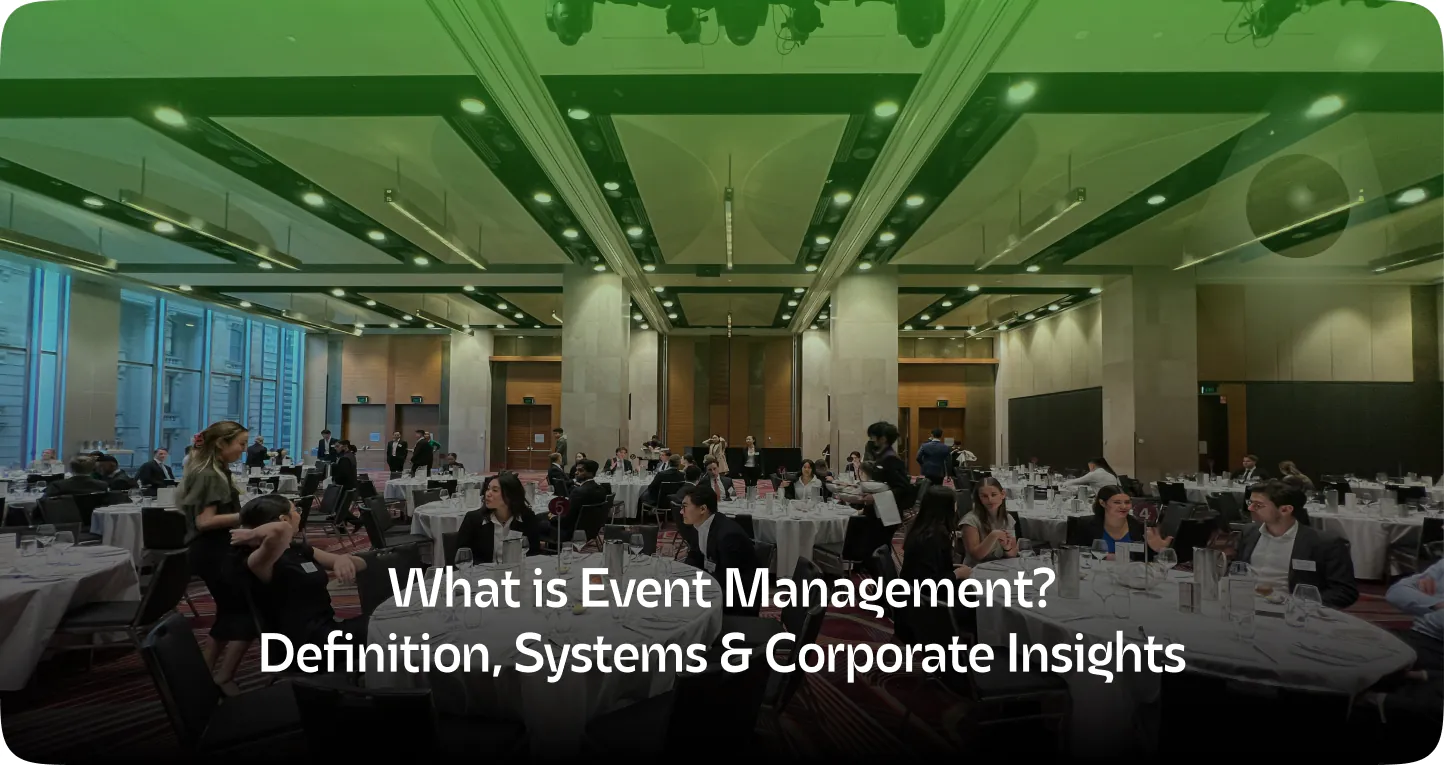From little get-togethers to major conferences and celebrations, event management is the strategic planning, organising, and running process. To guarantee a good event, it covers a range of tasks including financing, planning, choosing of a location, and technical aspect coordination. Businesses and people trying to produce memorable events depend on an awareness of event management.
Understanding Event Management
Event management is the application of project management ideas towards the planning and execution of events. Before the event, it entails determining the target audience, developing the event idea, organising logistics, and supervising technological elements. This procedure guarantees effective and efficient execution of events, therefore satisfying the goals stated by the planners.
What is Event Management Definition?
Industry standards define event management as the planning and coordination of the event including budgeting, scheduling, site selection, obtaining required permits, coordination of transportation and parking, speaker or entertainer arrangement, decoration, event security, catering, third-party vendor coordination, and emergency plans.
Key Components of Event Management
Planning and Strategy
Good event planning and strategic development start effective event management. This includes defining specific goals, deciding the extent of the event, and creating an all-encompassing strategy including all essential tools and actions for effective implementation.
Budgeting and Resource Allocation
In event planning, effective resource allocation is very crucial. This entails developing a thorough budget encompassing all expenses—including venue prices, equipment leases, personnel, marketing, contingency funds—that takes everything into consideration.
Venue Selection and Logistics
The success of the event depends much on the chosen site. Among the things to take into account are location, capacity, accessibility, and current amenities. Planning logistics guarantees that every component—including transportation, lodging, and on-site coordination—is properly handled.
Marketing and Promotion
Attaching desirable attendance and involvement levels requires the event’s promotion to the target demographic. Digital advertising, social media outreach, news releases, and ties with relevant companies might all be part of marketing plans.
Execution and On-site Management
Effective execution on the day of the event means organising all events, staff and volunteer management, guaranteed timely service delivery, and quick resolution of any unanticipated problems.
Post-Event Evaluation
Examining its performance in relation to the stated goals enables one to know what went well and what may be done better. This includes collecting guest comments, evaluating important performance measures, and recording knowledge gained for further projects.
What is Corporate Event Management?
Corporate event management is the arrangement of events in line with the corporate goals. Product introductions and conferences to team-building exercises and shareholder meetings may all fall under these events. Improving brand image, strengthening connections, and promoting corporate expansion is the aim.
Importance of Corporate Events
Marketing plans, employee involvement, and stakeholder communication all depend on corporate events in great part. They provide venues for networking, knowledge-sharing, and product or service exhibitions.
Planning Corporate Events
Organising business events calls for knowledge of the objectives, audience composition, and intended results of the firm. It calls for careful coordination of several components, including choice of location, agenda development, speaker scheduling, and adherence to business regulations.
What is an Event Management Company?
An event management firm specialises in organising and running events on client behalf. These businesses provide knowledge in many facets of event planning, including creative design, logistics, vendor coordination, and on-site management.
Services Offered
Event management companies provide a range of services, such as:
- Event conceptualization and design
- Venue sourcing and negotiation
- Vendor management
- Marketing and promotion
- Technical support
- On-site coordination
- Post-event analysis
Benefits of Hiring an Event Management Company
Hiring an event management firm may result in cost savings, industry network access, expert execution, and client stress lessened. Their knowledge and tools guarantee the successful and efficient delivery of events.
What is an Event Management System?
An event management system is a software application meant to simplify event planning, execution, and assessment of performance. These systems improve the general effectiveness of event administration by providing instruments for registration, ticketing, scheduling, communication, and analytics.
Features of Event Management Systems
Key features include:
- Online registration and ticketing
- Attendee management
- Agenda and scheduling tools
- Email marketing integration
- Mobile app support
- Real-time analytics and reporting
Benefits of Event Management Systems
By means of an event management system, one may achieve better organisation, greater attendee experience, data-driven decision-making, and scalability for simultaneous administration of many events.
What is Event Management Meaning?
Event management is the whole process of planning, organising, and running events to reach certain goals. To provide visitors unforgettable experiences, it combines technological, artistic, and logistical aspects.
What is Event Management All About?
Organising events is mostly about designing orderly and interesting experiences that satisfy the objectives of the planners and guest expectations. To guarantee good results, one must combine strategic preparation, meticulous attention to detail, and flexibility.
Conclusion
Anyone engaged in event planning, personal, business, or public—must first grasp what event management is. To create powerful experiences, it takes a multifarious strategy combining strategic planning, resource management, and creative execution.
Using professional services and event management solutions can help events to be even more successful and efficient. Mastering the ideas of event management can help people and companies to design unforgettable events that meet their intended goals and leave strong memories on participants.
FAQs
Event management is the process of planning, organizing, and running events like parties, conferences, or concerts to make sure everything goes smoothly and people enjoy the event.
The three main types are corporate events (business meetings, conferences), social events (weddings, parties), and public events (festivals, concerts, sports).
Event management involves planning, budgeting, coordinating vendors, managing logistics, marketing the event, and ensuring everything runs smoothly on the event day.




